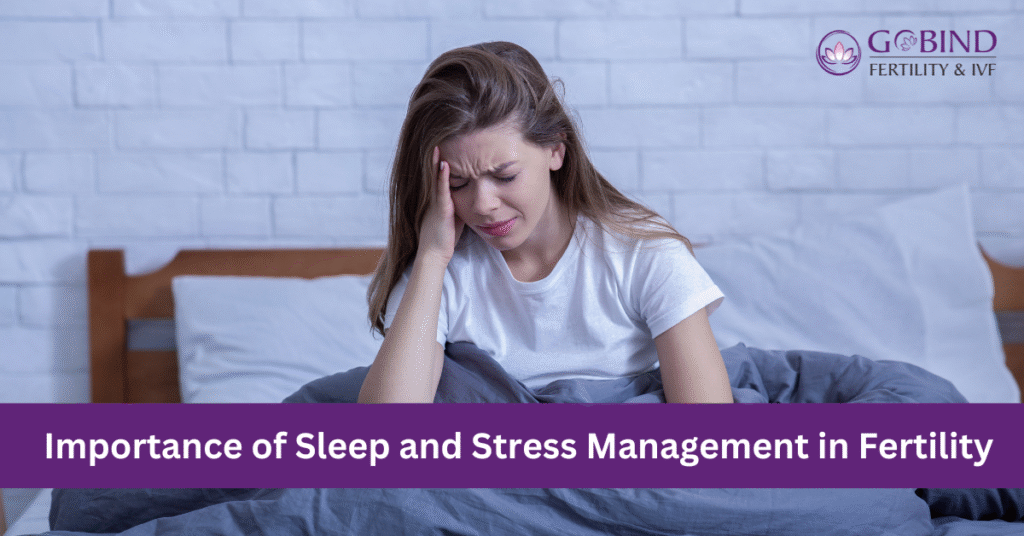The Importance of Sleep and Stress Management in Fertility

In today’s fast-paced world, the pressures of modern life can silently affect numerous aspects of health, especially fertility. While diet, age, and genetics often take centre stage in discussions about reproductive health, two often-overlooked factors—sleep and stress management—play crucial roles in fertility for both men and women. The increasing cases of infertility across the globe have drawn attention to these lifestyle elements, prompting experts and fertility centres, including Gobind Fertility & IVF Centre, to highlight the importance of sleep and stress management in fertility success.
Understanding the Link Between Sleep and Fertility
Sleep is not merely a time for the body to rest—it is a period during which vital hormonal processes occur. For those trying to conceive, this biological downtime becomes particularly critical.
- Hormonal Balance: During sleep, the body regulates hormones like melatonin, cortisol, and the reproductive hormones—estrogen, progesterone, luteinizing hormone (LH), and follicle-stimulating hormone (FSH). Disruptions in sleep patterns can lead to hormonal imbalances that directly affect ovulation in women and sperm production in men.
- Impact on Ovulation: Poor sleep or irregular sleep cycles can interfere with the menstrual cycle and reduce the chances of ovulation. Studies suggest that women with sleep disturbances have lower fertility rates, likely due to alterations in LH surges essential for releasing an egg.
- Male Fertility and Sleep: Sleep deprivation can also impact sperm quality and testosterone levels. Research shows that men who sleep less than 6 hours a night have significantly lower sperm counts and reduced motility compared to those who sleep between 7–8 hours.
At Gobind Fertility & IVF Centre, sleep hygiene is an integral part of fertility counselling. The centre’s fertility experts emphasise regular sleep schedules, reduced screen time before bed, and mindfulness practices to improve sleep quality, which in turn can enhance reproductive health.
Stress: A Silent Saboteur of Fertility
Stress is another significant barrier to conception, often underestimated by those trying to start a family. Chronic stress triggers a cascade of hormonal changes that can disrupt fertility.
- Cortisol and Reproductive Hormones: When under stress, the body releases cortisol, the primary stress hormone. Elevated cortisol levels can suppress the release of gonadotropin-releasing hormone (GnRH), which is essential for the menstrual cycle and sperm production. This can lead to irregular periods, anovulation, and reduced sperm quality.
- The Vicious Cycle: Couples facing fertility challenges often experience emotional stress, creating a vicious cycle—stress leads to reduced fertility, and the struggle with infertility leads to more stress.
- Mental Health and IVF Success Rates: Mental health is strongly linked to the success of fertility treatments. Anxiety and depression can negatively affect the outcome of assisted reproductive technologies (ART), like in-vitro fertilisation (IVF). At Gobind Fertility & IVF Centre, mental well-being is addressed alongside physical health, ensuring couples receive comprehensive care.
How Sleep and Stress Are Interconnected
It is essential to understand that sleep and stress are not isolated variables. Poor sleep increases stress, and high stress levels can disturb sleep. This cyclical relationship can severely impair hormonal functions that regulate reproduction. Therefore, managing one often helps improve the other.
Strategies for Better Sleep and Stress Management
Adopting lifestyle changes aimed at improving sleep and reducing stress can significantly enhance fertility outcomes. Below are some evidence-based strategies:
1. Establish a Sleep Routine
- Go to bed and wake up at the same time daily.
- Avoid stimulants like caffeine in the evening.
- Create a relaxing bedtime routine—reading, taking a warm bath, or practising deep breathing.
2. Practice Stress Reduction Techniques
- Yoga and Meditation: Regular yoga and mindfulness meditation help lower cortisol levels and support hormonal balance.
- Cognitive Behavioural Therapy (CBT): Effective in treating anxiety and depression, CBT can also help individuals navigate the emotional stress associated with infertility.
3. Exercise Moderately
- Physical activity helps reduce stress, promote better sleep, and regulate hormones. However, intense workouts may negatively affect fertility, especially in women, so balance is key.
4. Nutrition and Hydration
- A healthy, balanced diet supports sleep quality and reduces inflammation associated with stress.
- Certain foods like nuts, leafy greens, fatty fish, and berries are known to reduce cortisol levels.
5. Professional Support
- Sometimes lifestyle changes aren’t enough. In such cases, consulting a specialist is crucial. Gobind Fertility & IVF Centre provides access to in-house counsellors and therapists who work closely with patients to address sleep issues and emotional stress, enhancing their fertility journey.
Gobind Fertility & IVF Centre: A Holistic Approach
What sets Gobind Fertility & IVF Centre apart is its holistic, patient-centric approach to fertility. Recognising that fertility is not solely a medical condition but also a lifestyle-dependent issue, the centre incorporates sleep assessment and stress management protocols into their treatment plans.
From offering guided relaxation sessions to personalised counselling, Gobind Fertility believes in nurturing both the mind and body. Couples are educated on the importance of quality sleep and given practical tools to manage their stress throughout the fertility process. This integrated approach has not only led to higher IVF success rates but also improved the overall well-being of couples.
Final Thoughts
Infertility is a complex issue influenced by numerous factors, including sleep quality and stress levels. While advanced medical treatments such as IVF and IUI play a vital role in conception, no fertility plan is complete without addressing the lifestyle elements that underpin hormonal health.
Improving sleep and reducing stress are not just supportive measures—they are essential components of reproductive health. Whether you’re just beginning your fertility journey or have been navigating it for some time, incorporating healthy sleep and stress-reduction practices can make a significant difference.
As Gobind Fertility & IVF Centre emphasises, treating the root cause and creating a supportive, calming environment can go a long way in turning the dream of parenthood into reality. In the end, taking care of your emotional and physical well-being is one of the most powerful tools in your fertility toolkit.
